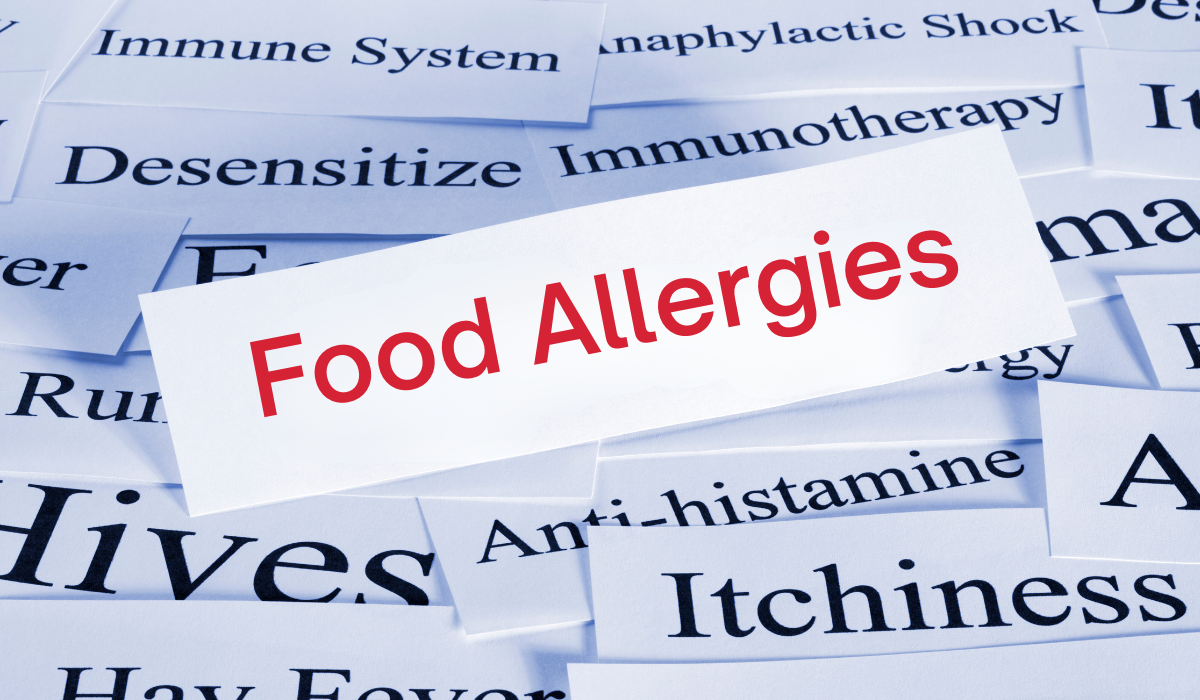A food allergy is a reaction of the immune system caused by eating a specific food. Even the smallest amount of that food can trigger a reaction. Reactions may include a rash or hives, upset stomach, and/or swelling in the airway. Severe reactions may cause the person to stop breathing.
About 7.6% of children have a known food allergy. Peanuts, shellfish, and milk are the three most common allergens. The risk of anaphylaxis should be considered for any student that has a diagnosed food allergy. Anaphylaxis is a severe and life-threatening allergic reaction, marked by constriction of the airways, leading to difficulty breathing.
To effectively manage food allergies and the risks, schools should have a comprehensive Food Allergy Policy at the district level, as well as a plan for the daily management of food allergies for individual children like an Emergency Care Plan and Individual Health Plan.
Research shows that food allergies are significantly more common in people with developmental disabilities, such as autism. People with food allergies are also more likely to develop asthma, hay fever, and eczema. Children with food allergies may also develop anxiety due to medical concerns.
- Food Allergies 101
- 10 School Planning Tips When Your Child Has Food Allergies
- Food Allergy Guidelines for Michigan Schools
How are food allergies managed?
There is no proven treatment to cure or prevent food allergies. The only way to avoid an allergic reaction is not to have contact with the allergen. Some people become less sensitive to allergens over time or with immunotherapy treatments. Some people become more sensitive over time.
- Webinar: Food Allergy Treatment and Management – FoodAllergy.org
Under what circumstances is a child eligible for special education services?
A health condition or disease is chronic if it is long-standing, always present or happens over and over. An acute health condition is one that happens suddenly, develops quickly, has intense symptoms and may last for a short period of time.
A student with allergies may be eligible under the Individuals with Disabilities Education Act (IDEA) identified with the eligibility category of other health impairment (OHI) if the student needs special education and related services because of the allergies and because the allergies adversely affect learning.
The key concept is that the child is eligible under OHI if the health condition causes: Limited strength, vitality, or alertness and has a negative effect on educational performance.
What do I need to think about for my child’s IEP?
The Individuals with Disabilities Education Act guarantees eligible children with disabilities a free and appropriate public education in the least restrictive environment. Students with food allergies may be eligible for services under the category of Other Health Impairment.
The Individualized Educational Program is a process that results in a document, the IEP, which guides the student’s education. This means parents and educators work together to make an educational plan that provides supports, services, accommodations and modifications that are individualized for the student. These supports and services are designed to help the student learn the general educational curriculum along with other students. A Medical Action Plan and/or Emergency Medical Plan will be written.
What if I’m told my child is not eligible for special education services?
Children who do not qualify for an IEP may still be eligible for a 504 Plan at school.
- Evaluation– includes sample letter, timelines, eligibility criteria, and FAQs
- Section 504– for students not eligible under IDEA
- Section 504 Protections for Students with Food Allergies Guidance from the U.S. Department of Education
Is there some technology that can help my student learn?
Assistive technology is a related service listed in IDEA, and it can be provided under Section 504. Technology is a key to leveling the playing field for individuals with disabilities. Learn more on our Assistive Technology webpage.
Are school lunches safe for my child?
If your child has an IEP or 504 Plan with accommodations for food allergies, you can request meals at school that are safe for your child. Your child’s physician will need to complete a Special Dietary Accommodations form. After returning the medical statement to the school team, the school foodservice department must make the substitutions as listed. These accommodations will be in addition to a Medical Action Plan or Emergency Medical Plan.
WHERE CAN I FIND SUPPORT?
- Food Allergy Research and Education (FARE) and Section 504.
- Food Allergy & Anaphylaxis Connection Team (FAACT)
- Kids With Food Allergies
MULTICULTURAL INFORMATION
Food Allergy Research and Education (FARE)
- Resources in Spanish
- Emergency posters for classroom or home use in multiple languages
- “Be A Pal” handouts for school use (grades K-12) in multiple languages


